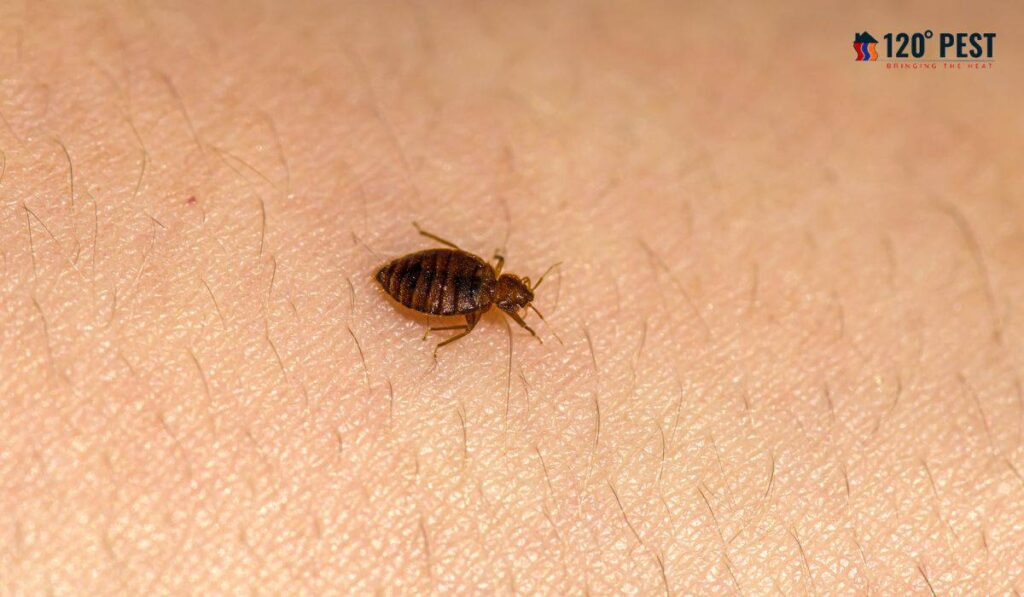In trucking, where long hours on the road and countless stops at different locations are part of the job, an unexpected and unwelcome passenger can make life on the road even more challenging.
We’re talking about bed bugs, and the issue of “bed bugging in trucking” is something every trucking company and driver should be aware of.
Identifying the Culprits: Bed Bugs
Bed bugs are tiny, blood-sucking insects notorious for infesting bedding, furniture, and even trucks.
These pests are incredibly resilient and can hitch a ride on almost anything, making them a common problem in transportation.
The Telltale Signs
Bed bug infestations in trucks can be identified through various signs, including:
- Minor, rust-colored stains on bedding or upholstery.
- Tiny eggshells or shed skins.
- Itchy, red welts on the skin.
Health Risks
The presence of bed bugs in a truck poses health risks to the drivers and anyone who enters the vehicle.
Bed bug bites can cause itching, rashes, and allergic reactions.
The stress and lack of sleep resulting from an infestation can also impact a driver’s overall well-being.
Economic Consequences
For trucking companies, bed bug infestations can have substantial economic consequences.
They can lead to costly treatments, damage to cargo, and even legal issues.
Moreover, a trucking company’s reputation can be tarnished if they’re known for having bed bug problems.
Proactive Measures
Preventing bed bug infestations is the best approach.
Trucking companies should establish strict hygiene protocols and train their drivers to be vigilant.

Regular inspections and cleaning can go a long way in keeping bed bugs at bay.
Professional Extermination
In the unfortunate event of an infestation, it’s essential to call in professional exterminators.
They have the expertise and tools to eradicate bed bugs effectively.
After extermination, decontamination is crucial to ensure the truck is safe.
Staying Vigilant on the Road
Truck drivers should also take personal responsibility for preventing bed bugs.
This means being cautious at rest stops, motels, and other locations where they might pick up these unwanted passengers.
Legal Aspects of Bed Bugging in Trucking
Ignoring bed bug infestations can lead to legal troubles.
Trucking companies should be aware of their legal obligations and responsibilities regarding pest control.
Spreading Knowledge in the Trucking Industry
Bed bug awareness is critical to combating the problem.
Sharing information and experiences can help the entire trucking industry stay on guard against these pests.
Maintaining a Hygienic Trucking Environment
Cleanliness is crucial.
Regular cleaning, especially of bedding and upholstery, can help prevent bed bug infestations.
Real-Life Experiences
A case study on a trucking company that faced and overcame bed bug infestations can provide valuable insights for others in the industry.
Companies that Conquered Bed Bugging
Success stories of trucking companies that effectively dealt with bed bugs can serve as inspiration for others.
Voices from the Trucking Community
Hearing from fellow truck drivers about their experiences with bed bugs and how they managed the situation can be informative and reassuring.
Thoughts from Pest Control Professionals
Experts in pest control can provide additional insights into effective prevention and treatment strategies.
Conclusion
In conclusion, bed bugging in trucking is a real issue that can affect trucking companies’ health, finances, and reputation.
Being proactive in prevention, staying vigilant, and seeking professional help when needed are essential strategies to tackle this problem head-on.
Frequently Asked Questions (FAQs)

What are the first signs of a bed bug infestation in a truck?
The first signs often include minor, rust-colored stains on bedding or upholstery, tiny eggshells, and itchy welts on the skin.
How can bed bugs affect a trucking company’s reputation?
Bed bug infestations can lead to negative publicity, damaging a company’s reputation in the eyes of customers and partners.
What are the legal consequences of ignoring bed bug infestations?
Ignoring bed bug infestations can lead to legal troubles, including potential lawsuits and fines for negligence.
Are there any natural remedies for bed bug control in trucks?
While natural remedies exist, professional extermination is often the most effective solution for truck bed bug infestations.
How often should truck drivers inspect their vehicles for bed bugs?
Regular inspections are crucial. Drivers should inspect their trucks whenever they spend time at locations that could be infested with bed bugs.
Can bed bugs survive extreme temperatures inside a truck?
Bed bugs are resilient, but extreme hot and cold temperatures can be lethal to them. However, consulting with pest control professionals for the most effective temperature-based treatments is essential.
Are any specific regions or routes more prone to bed bug infestations in the trucking industry?
Bed bugs are not limited to specific regions; areas with high population densities and frequent stops may have a higher risk. Vigilance and preventive measures are crucial, regardless of the route.
How can drivers protect their belongings from bed bug infestations on the road?
Drivers can use bed bug-proof luggage encasements to protect personal items and keep their belongings off the floor or bedding in truck cabins. Regularly inspecting personal items can also help catch any infestations early.
What should trucking companies do to educate their employees about bed bug prevention?
Companies can conduct training sessions, distribute informational materials, and encourage open communication among drivers to raise awareness about bed bug prevention and management.





Can you be more specific about the content of your article? After reading it, I still have some doubts. Hope you can help me.
pin up apk yukle https://azerbaijancuisine.com/# pin up kazino
pin up az
pin-up kazino: pin up azerbaycan – pin-up online casino
Hi there, just became alert to your blog through Google, and found that it is really informative.
I am going to watch out for brussels. I’ll appreciate if you continue
this in future. A lot of people will be benefited from
your writing. Cheers! Escape roomy lista
п»їbest mexican online pharmacies: purple pharmacy mexico price list – buying prescription drugs in mexico online
buying from online mexican pharmacy
https://cmqpharma.online/# best online pharmacies in mexico
buying from online mexican pharmacy
Very interesting points you have observed, appreciate it for putting up.!
northwest canadian pharmacy: canadian pharmacy victoza – maple leaf pharmacy in canada
https://indiapharmast.com/# online shopping pharmacy india
top online pharmacy india: cheapest online pharmacy india – п»їlegitimate online pharmacies india
buying from online mexican pharmacy mexican pharmaceuticals online mexico pharmacies prescription drugs
mexican mail order pharmacies: mexico pharmacy – mexican mail order pharmacies
buy medicines online in india: pharmacy website india – best india pharmacy
buying prescription drugs in mexico online mexico drug stores pharmacies п»їbest mexican online pharmacies
https://foruspharma.com/# mexican rx online
buying from online mexican pharmacy: pharmacies in mexico that ship to usa – medicine in mexico pharmacies
buy medicines online in india: indian pharmacies safe – indian pharmacy online
ordering drugs from canada: canadian online pharmacy – canada drugstore pharmacy rx
https://foruspharma.com/# п»їbest mexican online pharmacies
buying prescription drugs in mexico: mexican drugstore online – mexican online pharmacies prescription drugs
I’m amazed, I have to admit. Seldom do I encounter a blog that’s equally educative and entertaining, and without a doubt, you have hit the nail on the head. The problem is something not enough folks are speaking intelligently about. I’m very happy that I stumbled across this in my search for something concerning this.
canadian pharmacy drugs online: canadian 24 hour pharmacy – pharmacies in canada that ship to the us
http://paxloviddelivery.pro/# paxlovid for sale
I like it when folks come together and share views. Great website, continue the good work.
how to get clomid without rx: how to buy generic clomid no prescription – cost of clomid
http://doxycyclinedelivery.pro/# cheap doxycycline tablets
May I just say what a comfort to discover an individual who genuinely knows what they are discussing on the net. You definitely know how to bring an issue to light and make it important. More people really need to check this out and understand this side of the story. It’s surprising you aren’t more popular since you certainly possess the gift.
https://ciprodelivery.pro/# ciprofloxacin order online
ciprofloxacin generic: ciprofloxacin over the counter – buy ciprofloxacin
I couldn’t refrain from commenting. Very well written!
http://doxycyclinedelivery.pro/# doxycycline 20mg canada
Excellent site you’ve got here.. It’s hard to find high quality writing like yours nowadays. I really appreciate individuals like you! Take care!!
doxycycline 100mg price australia: where to buy doxycycline in singapore – doxycycline online singapore
https://amoxildelivery.pro/# order amoxicillin online no prescription
Great post! We are linking to this particularly great article on our website. Keep up the good writing.
http://paxloviddelivery.pro/# buy paxlovid online
Your style is really unique compared to other folks I have read stuff from. Many thanks for posting when you have the opportunity, Guess I will just bookmark this site.
cipro online no prescription in the usa: ciprofloxacin – buy cipro online canada
Hi there! This post couldn’t be written any better! Looking through this post reminds me of my previous roommate! He always kept talking about this. I will forward this information to him. Pretty sure he’ll have a good read. Many thanks for sharing!
https://paxloviddelivery.pro/# paxlovid generic
May I simply say what a comfort to uncover someone who genuinely knows what they are talking about on the web. You definitely know how to bring a problem to light and make it important. A lot more people must check this out and understand this side of your story. I was surprised that you are not more popular given that you certainly have the gift.
http://ciprodelivery.pro/# buy cipro online canada
where can i buy amoxocillin: amoxicillin 500 mg price – amoxicillin capsules 250mg
Howdy! This blog post could not be written any better! Going through this post reminds me of my previous roommate! He continually kept talking about this. I most certainly will send this post to him. Fairly certain he’ll have a good read. Thanks for sharing!
http://amoxildelivery.pro/# amoxicillin 750 mg price
paxlovid pill: paxlovid buy – paxlovid covid
buy ciprofloxacin: antibiotics cipro – buy cipro online without prescription
This site was… how do I say it? Relevant!! Finally I’ve found something which helped me. Thanks.
Great blog you’ve got here.. It’s difficult to find good quality writing like yours nowadays. I truly appreciate individuals like you! Take care!!
The very next time I read a blog, Hopefully it won’t disappoint me just as much as this one. I mean, I know it was my choice to read, nonetheless I truly believed you’d have something helpful to talk about. All I hear is a bunch of complaining about something that you could fix if you were not too busy looking for attention.
The very next time I read a blog, I hope that it does not fail me as much as this particular one. I mean, I know it was my choice to read, but I truly believed you would probably have something interesting to say. All I hear is a bunch of moaning about something you could possibly fix if you weren’t too busy searching for attention.
Pretty! This was a really wonderful article. Thank you for supplying this info.